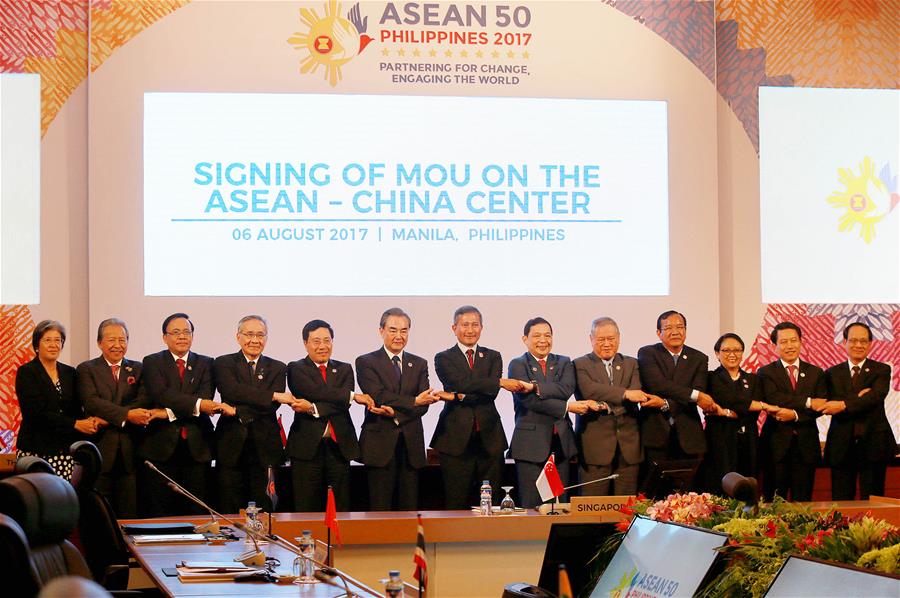China, ASEAN eye broader cooperation
The foreign ministers of the Association of Southeastern Asian Nations (ASEAN) agreed on Sunday that continued economic growth in China would benefit ASEAN members and the bloc anticipates a higher level of strategic partnership with China.
|
|
|
Chinese Foreign Minister Wang Yi (6th L) attends the signing ceremony of the amended version of the Memorandum of Understanding on Establishing China-ASEAN Center in Manila, the Philippines, Aug. 6, 2017. (Xinhua/Rouelle Umali) |
China-ASEAN pragmatic cooperation wins approval
In a joint communique issued here on Sunday, the ASEAN foreign ministers commended China's growing role in the region and expressed expectations for more high-level dialogue and higher level of economic integration.
They welcomed the entry into force of the Protocol to Amend the Framework Agreement on Comprehensive Economic Cooperation and Certain Agreements between ASEAN and China (ACFTA Upgrade Protocol) and looked forward to early ratification of the protocol by the remaining parties.
"This will help support the twin goals to reach a two-way trade and investment of 1 trillion U.S. dollars and 150 billion U.S. dollars respectively by 2020," said the communique.
The year 2018 marks the 15th anniversary of the establishment of the China-ASEAN strategic partnership and the ministers expect to designate 2018 as the ASEAN-China Year of Innovation Cooperation, and formulate a 2030 Vision for China-ASEAN Strategic Partnership as a blueprint to guide future relations.
More cooperation in infrastructure construction, tourism, air transportation, anti-corruption, environment protection and other areas between the two sides should also be conducted.
These protocols coincide with the remarks of Chinese Foreign Minister Wang Yi when he was interviewed by media. Wang said China and ASEAN are facing new opportunities for greater development, and that the China-ASEAN strategic partnership has stepped into a new phase of comprehensive development.
China and the ASEAN nations are close to each other geographically and share a long time of friendship. During the past 50 years, the two sides have harvested tremendous results in cooperation in many areas including two-way trade, said the joint communique.
China has become ASEAN's biggest trade partner, and the ASEAN countries look forward to participating in China's Belt and Road Initiative to further expand the scope and dimension for bilateral cooperation.
South China Sea Issue
In the joint communique, ASEAN foreign ministers took note of the improving situation in the South China Sea over the past year, saying it reflected the positive results of cooperation in the region.
Participants at the meeting agreed that promoting peace, stability and prosperity in the South China Sea will benefit all parties.
They welcomed the adoption of the framework for the Code of Conduct (COC) in the South China Sea and the successful testing of the MFA-to-MFA (ministry of foreign affairs-to-ministry of foreign affairs) hotline to manage maritime emergencies. They look forward to the operationalization of the joint statement on the observance of the Code for Unplanned Encounters at Sea (CUES) in the South China Sea, which is part of practical measures that could reduce tensions, the risks of accidents, misunderstanding and miscalculation.
For the first time ever, the communique underlined "the importance of non-militarization and self-restraint in conducting activities" by claimants and all other states, including those mentioned in the Declaration on the Conduct of the Parties in the South China Sea (DOC).
Despite the consensus and joint endeavors made by China and most ASEAN members in easing disputes in the South China Sea, Vietnam tried to force its own agenda into the draft communique, a source close to the meeting told Xinhua.
Vietnam wanted to insert sentences such as "construction on islands and reefs" into the draft communique. Such a move of Vietnam aimed at exerting pressure on China was futile, and the phrase was finally dropped due to opposition from other ASEAN countries, the source said.
More than one year after an ill-founded award at a South China Sea arbitration unilaterally delivered by an ad hoc tribunal in The Hague, the situation in the South China Sea has stabilized and improved thanks to the wisdom and sincerity of China and the parties concerned.
In such a cordial atmosphere, the move of Vietnam is not only against the positive trend in the South China Sea, but is also meant to undermine unity of ASEAN against the will of the people there.
